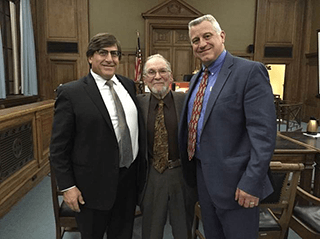Loss of Consortium Claims in Spotlight After Recent Connecticut Supreme Court Decision
Loss of Consortium Claims in Spotlight After Recent Connecticut Supreme Court Decision
In July, the Connecticut Supreme Court issued a unanimous decision holding that certain rights which were limited to heterosexual married couples prior to the state’s approval of civil unions and later same-sex marriage could be exercised by now-legal same-sex spouses. Specifically, the Court allowed a widow to sue a doctor in a medical malpractice case for the death of her spouse and the loss of her spouse’s companionship and income. The alleged malpractice occurred from 2001 to 2004, a time when only legally married couples were allowed to sue for loss of spousal “consortium.”
“We agree with [plaintiff’s] claim that this court should expand the common-law claim for loss of consortium to members of couples who were not married when the tortious conduct occurred, but who would have been married if the marriage had not been barred by state law,” wrote Chief Justice Chase T. Rogers.
What is “Consortium”?
Loss of consortium claims for married couples have a long history. They are claims made by the spouse of a person injured or killed due to negligent or reckless conduct. They are grounded in the recognition of the central importance and value that deep and committed relationships have for those in them and the reality that serious injuries to a spouse can turn that relationship upside down.
After a serious injury to a spouse, the other spouse must now deal with the significant financial, practical, and emotional burdens of caring for the injured person. The economic losses caused by the injury or death in terms of lost income or participation in maintaining the household can be devastating. Many injuries can cause long-term physical and psychological damage that can deprive a spouse of the love, affection, companionship, and assistance that was a core aspect of their lives prior to the accident.
In these cases, it’s not uncommon for a spouse to file his or her own claim within the personal injury (negligence) lawsuit. Connecticut courts and statutes recognize these “loss of consortium” claims, designed to compensate spouses for the loss of a normal relationship and all that entails. For example, Connecticut General Statute Section 52-555b provides that loss of consortium claims arising out of the death of a spouse “may include, without limitation, claims for damages with respect to loss of the society of, affection of, moral support provided by, services provided by, sexual relations with or companionship of the other spouse…” That statute also provides that the loss of consortium claim shall be brought with or joined with any other claims and causes of action brought by the executor or administrator of the decedent’s estate with respect to the death of the other spouse.
Establishing a Loss of Consortium
To recover damages under a theory of loss of consortium, a spouse must prove the value of the loss. Damages awarded for loss of consortium include both past and future loss and are measured by the extent of the loss incurred, to the extent that money can measure it. Judges and juries consider a number of factors when calculating loss of consortium damages, including:
- The stability of the marriage
- The life expectancy of both husband and wife
- The nature and extent of the loss
It is important to note, however, that loss of consortium claims are “derivative” actions. This means, in part, that if the injured spouse or their estate does not recover damages in their suit arising out of the injury or accident, there can be no recovery for the spouse for loss of consortium.
Nugent & Bryant: Your Connecticut Personal Injury Law Firm
At Nugent & Bryant, we have worked hard to build a reputation as one of Connecticut’s premier law firms advocating for accident victims’ rights. We are an exceptional law firm that has been achieving results for our clients over 30 years. If you have suffered a personal injury or catastrophic injury, call us today at (203) 795-1111 for a free consultation.
This article has been prepared by Nugent & Bryant for informational purposes only and does not, and is not intended to, constitute legal advice. The information is not provided in the course of an attorney-client relationship and is not intended to substitute for legal advice from an attorney licensed in your jurisdiction.
Tell Us About Your Case
Contact Us
We will get back to you as soon as possible.
Please try again later.
Nugent Lawyers © 2009 - 2024. All Rights Reserved - Disclaimer


